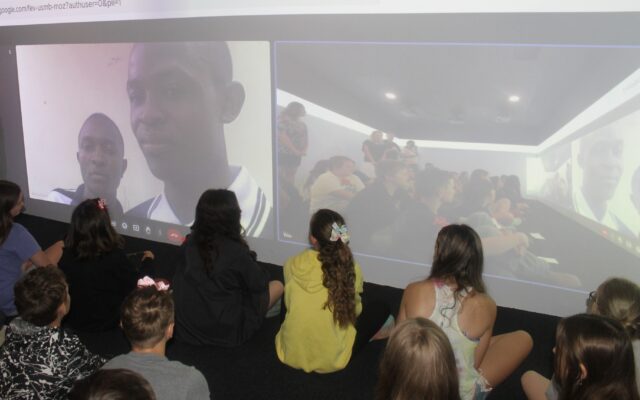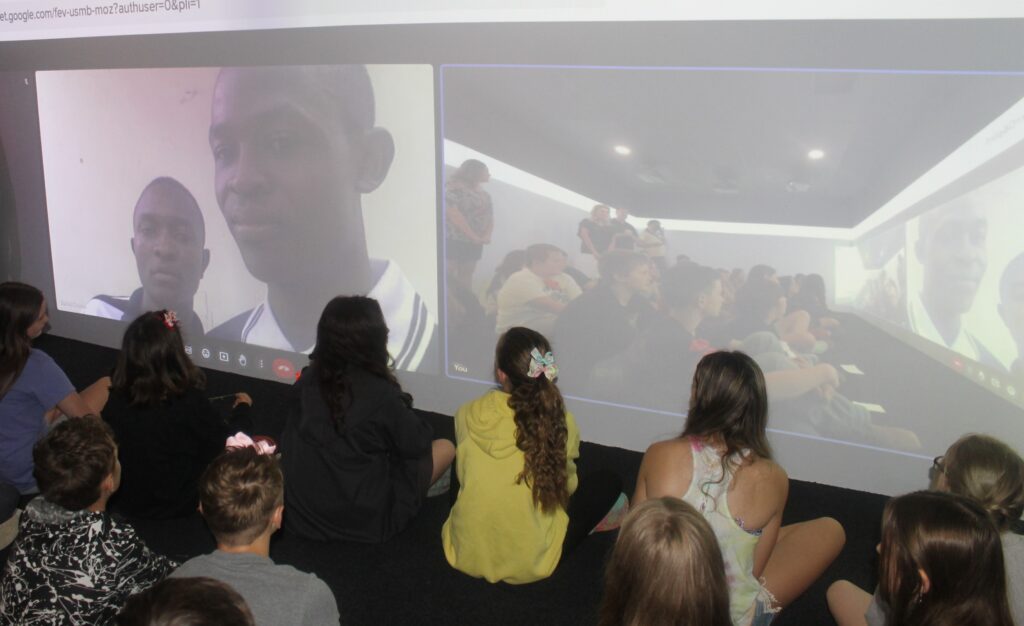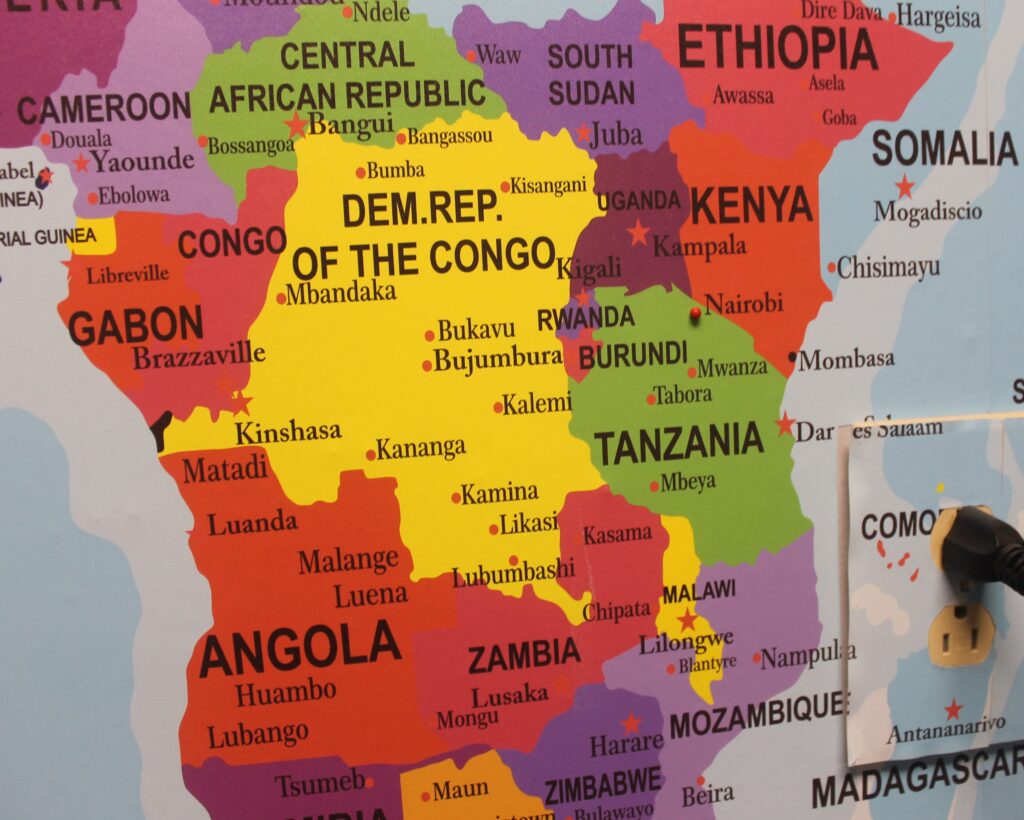
PCES sixth-graders make a difference across the globe
GUILFORD — Piscataquis Community Elementary School sixth-graders answered their principal’s challenge to make a difference globally. The students raised $5,145 to fund seven doors, 26 windows, 26 panes of glass, and 37 desks/chairs for a remote village school in the east African nation of Tanzania.
On Friday, June 16 the two-dozen plus students began their last day of classes by gathering in the “Pirate Portal” 360-degree virtual reality classroom to speak with teachers and students at the Point of Impartation Pre and Primary School on the other side of the world in northern Tanzania – located south of the Equator near the Kenyan border and east of Lake Victoria — after announcing their donation through the “Make a Difference Project.”
Principal Anita Wright said last year she challenged the then grade 6 students to make a difference. “I really wanted the students to see that they have a lot of power to do good and that there are a lot of problems that they could help with in the world,” she said.
For 2022-23, it was decided that raising funds for a school in Tanzania would be a worthy project. Foxcroft Academy Chief Technology Officer Rob Brown has made seven trips to the village helped by PCES through Eagle Projects International — a gospel-driven organization committed to bringing Christ to the nations through evangelism, education, church planting, and humanitarian projects — including the most recent this past April.

FROM GUILFORD TO TANZANIA — Piscataquis Community Elementary School sixth-graders talk with teachers and students at a remote village school in Tanzania on June 16 in the Pirate Portal virtual reality classroom. The PCES students raised over $5,100 to fund windows, doors, and desks/chairs for the school after being challenged to make a difference in the world.
Wright said the students saw a memorial clip for peace activist Samantha Smith, and she then challenged the sixth-graders to think about how they would make a difference and make their mark on the world. “I am so very proud of all of them, they reached their goal and they put their hearts into it,” the principal said. “It really shows that when they work together what they’re capable of. One of my personal goals for them was ‘you do good, you feel good’ — which is what they did.”
“The whole idea of gratitude is important, in today’s world I think it is so important to help students be grateful that they have so much and that they can do so much,” Wright said, saying she was happy to hear the sixth-graders say this themselves and how they feel they can give back.
“We’re already talking about our next project,” the principal added about plans for the rising grade 6 students.
“We did a fundraiser for Tanzania for the ‘Make a Difference Project’ to help kids in Tanzania get doors and windows and kind of help their school grow,” Mya Knight said. She mentioned a bake sale, hike-a-thon, and carnival as some of the fundraisers the students held.

ON THE MAP — A red pin near the N in Nairobi marks the approximate location of a village school in Tanzania that will receive building supplies and classroom furniture through fundraising efforts of Piscataquis Community Elementary School sixth-graders.
“It was fun but it also took a lot of effort,” she said, mentioning that the goal of raising $4,000 was exceeded by well over $1,000.
Knight said the entire effort made her feel very happy, “We helped people across the world that we pretty much didn’t know existed and it felt really good to help somebody in need.”
She also enjoyed the unexpected session in the Pirate Portal, saying, “I waved to one of them and they waved right back.”
“I learned that there’s lots of towns, more than I thought there was, in Africa and Tanzania,” Knight said. Adding, “If you ever get a chance to help somebody, do it.”
“I learned not everyone is just like us,” Hayden Hunt said. She said people around the world do not all enjoy the same luxuries as she and her peers, “So we should be grateful for what we have.’
Hunt said it felt great to help the Tanzanian students, and the doors and windows will help keep out disease-carrying mosquitoes.
Savannah Cates said the fundraising was difficult but rewarding. “You realize you are not doing this for yourself, you are doing this for other people and that kind of gave you the motivation to keep going,” she said, mentioning a lemonade stand as one of the fundraisers she took part in.
Cates said she is glad all the efforts paid off and she learned to be grateful for what she has.
“If you set your mind to something you can definitely achieve it because when I first heard about it, I was like ‘there’s no way we can do this,’” she said. “And then, here we are with over $5,000. It’s just super cool to think that we overachieved our goal when I didn’t really think we could, so you can do whatever you set your mind to.”
Cates’ advice for others is to “try to set a smaller goal and then you can keep lifting it up like stepping stones, you can definitely do what you want to do. Don’t be scared to do it.”
Brown explained Eagle Projects International “works around the world doing many different things, medical clinics, eyeglass clinics, pastoral training, humanitarian projects. They work in countries in Asia, Africa. They’re doing some work now in South America, so all over the world.”
He said on his first trip to the nation of nearly 62 million 20 years ago he met the founders of the Point of Impartation Pre and Primary School. The school has grown from about 50 pupils to 225 and “it’s an amazing job they are doing with what little they have.”
“It’s going to make a big difference in the students’ lives,” Brown said about the PCES students’ contribution. “School for them is not a right, it’s a privilege for them to have a school they can go to and now where they can be safe, where they can have their things protected when they are not at school. It’s just going to make a much safer environment from things like theft, animals coming in, malaria. It’s going to make a big difference in these kids’ lives.”
Brown said Foxcroft Academy had some older iMacs replaced. These were put up for sale to students at a reasonable price and proceeds were donated to the “Make a Difference Project” for another $1,000.
“That’s what we all need to do, help the people around us whether it’s in your backyard or on the other side of the world,” he said.
At 8 a.m. for the PCES students and 3 p.m. for those in Tanzania the two groups met virtually for the first time through the Pirate Portal. Brown had previously used one of the classroom’s 360 GoPro Cameras to film the village so the sixth-graders had an understanding of the layout beforehand.
Wright told those in Tanzania that her students raised $5,145 in American dollars.
“They wanted to help by buying windows, doors, and some furniture for your school,” she said as she passed along an oversized novelty check with the students’ signature around the edges to Brown.
Questions were asked of each other, such as favorite subjects in school. Swahili is only offered in Tanzania, but both groups of pupils have science and math classes. The PCES sixth-graders learned about how students in Tanzania need to walk great distances to come to school even in rainy weather, but they could relate to how their African peers like to play soccer for fun (with Brown explaining that in Tanzania the sport is known as football).
They also mentioned the difference in climates between Maine and sub-Saharan Africa.
Both groups of students agreed they would like to visit each other.“I see a field trip in our future,” Wright joked.
She said that after the virtual visit, the sixth-graders would be having a step up day at Piscataquis Community Secondary School next door. The principal was asked if her students have to take a national examination in order to advance to the next grade as is done in Tanzania. She said no, “The teachers determine that, not the exam.”